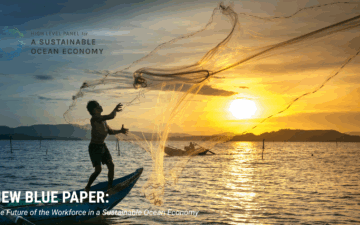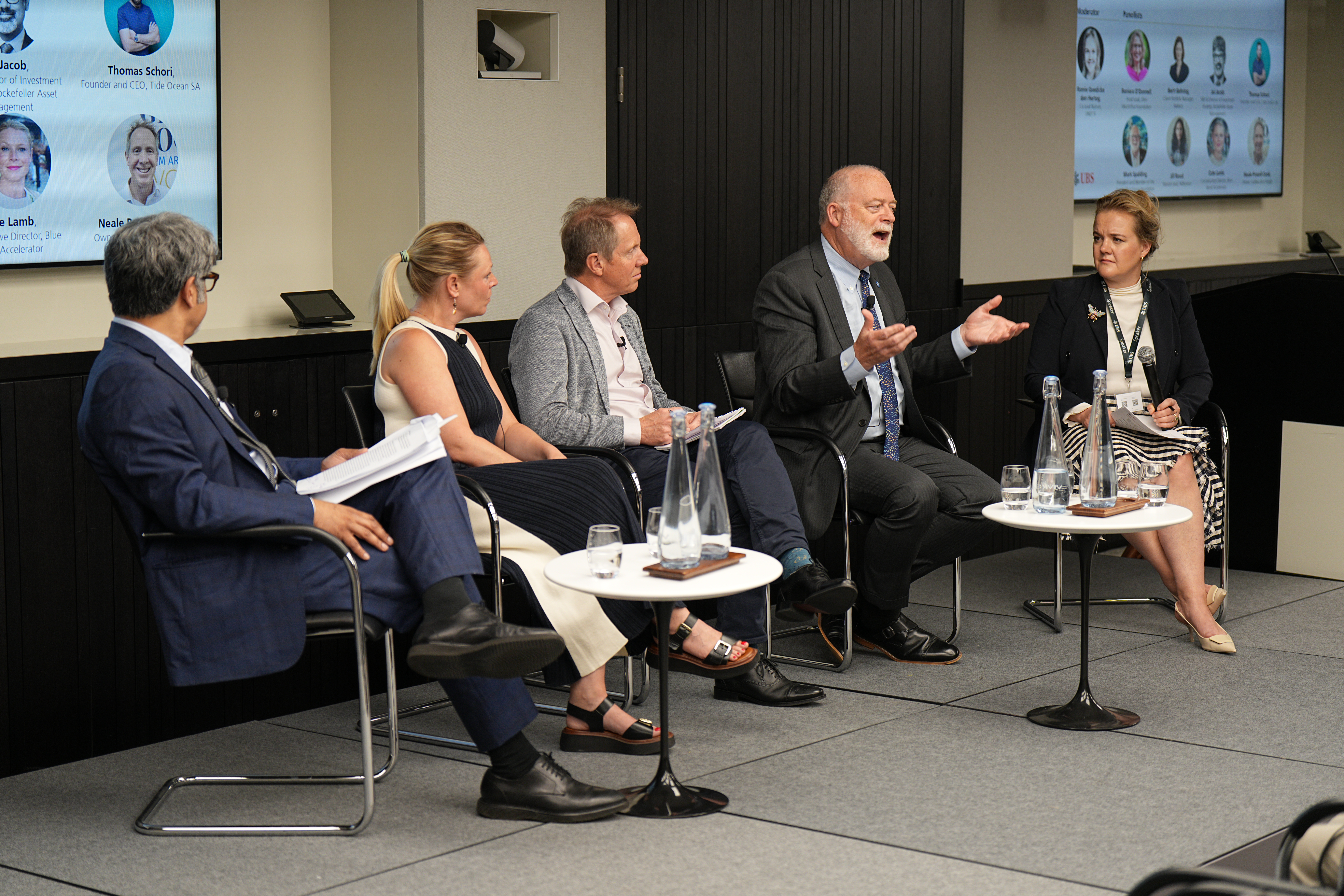Submitted to NOAA on 2 April 2021
In response to the recent Executive Order on Tackling the Climate Crisis at Home and Abroad NOAA has been instructed to collect recommendations on how to make fisheries and protected resources more resilient to climate change, including changes in management and conservation measures, and improvements in science, monitoring, and cooperative research.
We at The Ocean Foundation welcome the opportunity to respond. The Ocean Foundation and its current staff have been working on ocean and climate change issues since 1990; on Ocean Acidification since 2003; and on related “blue carbon” issues since 2007.
The Ocean-Climate Nexus is well established
The effects of increasing greenhouse gas emissions threaten coastal and marine ecosystems through changes in ocean temperature and melting of ice, which in turn affect ocean currents, weather patterns, and sea level. And, because the capacity of the ocean to absorb carbon has been exceeded, we are also seeing the ocean’s chemistry change because of our carbon emissions.
Changes in temperature, currents and sea level rise, will ultimately affect the health of all marine species, as well as nearshore and deep ocean ecosystems. Most species have evolved to thrive in relatively specific ranges of temperature, chemistry, and depth. Certainly, in the short term, it is the species that cannot migrate and move to cooler places in the water column or to cooler latitudes that are most affected. For example, we have already lost over half of all coral due in part to warming water killing the coral building animals leaving the white skeletal structures behind, a process known as coral bleaching, which was virtually unheard of at scale until 1998. Corals and shellfish, like the pteropods at the base of the food chain, are particularly vulnerable to changes in ocean chemistry.
The ocean is an integral part of the global climate system and a healthy ocean is essential to human well-being and global biodiversity. For starters, it generates oxygen and many of the changes underway will affect the ocean’s process. Ocean waters, ocean animals, and ocean habitats all help the ocean absorb a significant portion of the carbon dioxide emissions from human activities. For human survival over time, we need those systems to be healthy and work well. We need the ocean for temperature control of the planet, production of oxygen via photosynthesis of phytoplankton, food etc.
There will be consequences
There are economic threats with short and long term consequences:
- Sea level rise has already and will continue to reduce property values, damage infrastructure, and increase investor risk exposure
- Temperature and chemical disruptions in the waters are reshaping global fisheries, affecting the abundance of commercial and other fish stocks and fishery shifts to new geographies
- Shipping, energy production, tourism, and fisheries are and will be increasingly disrupted by the increasing unpredictability of weather patterns, storm frequency and intensity, and local conditions
Thus, we believe climate change will transform economies.
- Climate change poses a systemic threat to financial markets and the economy
- The cost of taking action to reduce human disruption of the climate is minimal relative to the harm
- And, because climate change is and will transform economies and markets, firms producing climate mitigation or adaptation solutions will outperform the broader markets over the long run
So, what should we do in response?
We need to think about creating jobs that benefit the ocean, and reduce the activities that harm the ocean (and the human communities where those activities take place) because it is our biggest ally in fighting climate change. And, because reducing harm increases resilience.
The overarching goal to reduce greenhouse gas (GHG) emissions must not be just achieved, but accomplished by transitioning to a more equitable and environmentally just plan to reduce pollution while meeting global food, transportation, and energy needs. As societies move forward to mitigate climate change, it is vital to do so ethically, through helping vulnerable communities and protecting wildlife and ecosystems.
Restoring ocean health and abundance means positive economic returns AND climate change mitigation.
We need to make efforts to:
- Increase positive economic activities such as ocean-based renewable energy, which both creates jobs and provides cleaner energy.
- Reduce emissions from ocean-based transport and engaging new technologies to make shipping more efficient.
- Preserve and restore coastal and marine ecosystems to increase abundance and enhance carbon storage.
- Advance policy that promotes the roles coastal and ocean ecosystems play as natural carbon sinks, i.e. blue carbon.
- RESTORE and CONSERVE important coastal habitats that sequester and store carbon, including seagrass meadows, mangrove forests, and salt marshes.
Which all means the ocean can
- Play a huge role in reducing CO2 emissions closing the emissions gap in a 2 degree scenario by about 25% (Hoegh-Guldberg, O, et al, 2019), and thus mitigating climate change impact on all communities.
- Provide the opportunities for exciting new technologies, investment sub-sectors, and economic stabilization in the face of change.
How we are playing our part:
The Ocean Foundation is:
- RESTORING and CONSERVING important coastal habitats via our Blue Resilience Initiative with a focus on community protection and climate resilience through natural infrastructure.
- Supporting scientific research on the environmental, economic, and social benefits of blue carbon ecosystems (i.e. seagrasses, mangroves, and salt marshes) to create and expand mechanisms for market-based and philanthropic financing.
- Coordinating training workshops and other learning activities related to the restoration and conservation of blue carbon resources.
- Supporting scientific and industrial research on the environmental, economic, and social benefits of utilizing seaweed as agriculture-enhancing products.
- Pioneer new business models for market-based and philanthropic financing of seaweed-based carbon offsetting through soil building and regenerative agriculture.
- Improving and expanding scientific monitoring of the changes in ocean chemistry, and pushing for adaptation and mitigation through our International Ocean Acidification Initiative.
- Supporting the UN Decade of Ocean Science for Sustainable Development via a platform hosted by The Ocean Foundation that will coordinate funding activities in support of the Decade including the new “EquiSea: The Ocean Science Fund for All.” EquiSea aims to improve equity in ocean science through a philanthropic fund providing direct financial support to projects, coordinating capacity development activities, and fostering collaboration and co-financing of ocean science among academic, government, NGO, and private sector actors.
About The Ocean Foundation
The Ocean Foundation (TOF) is an international community foundation based in Washington D.C., established in 2003. As the only community foundation for the ocean, its mission is to support, strengthen, and promote organizations dedicated to reversing the trend of destruction of ocean environments around the world. TOF hosts and supports more than 50 projects and has grantees in over 40 countries on 6 continents, focusing on building capacity, conserving habitats, ocean literacy, and protecting species. TOF’s Staff and Board is comprised of individuals with significant experience in marine conservation and philanthropy. It also has a growing international advisory board of scientists, policy makers, educational specialists, and other top experts.
For more information:
Jason Donofrio, External Relations Officer
+1.202.318.3178







